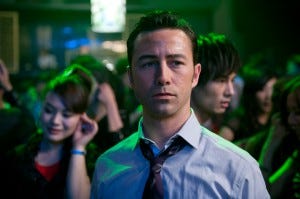Gone For a Loop
Looper
Directed by Rian Johnson
Starring Bruce Willis, Joseph Gordon-Levitt
Rated R
$10 general, $7.50 for students

“Goddamn twentieth-century affectations,” Abe (Jeff Daniels), crime boss from the future, says bitingly to the young looper Joe (Joseph Gordon-Levitt) in reference to Joe’s retro outfit. It’s a nice phrase; it also happens to be one that describes the movie a little too well.
Looper is twenty-first century flash-and-bang with twentieth-century decorations, all beneath a surface image of intelligent and thoughtful writing. At first glance, the idea is brilliant: crime syndicates from thirty years in the future use illegal time-machines to send targets back into the past for “loopers,” contracted killers, to kill and then dispose of. The allure of the process is in its cleanliness. Kill the future, so the past won’t ever make it there.
Then you see scene after scene of targets blinking into existence on a cheap, white tarp in a wheat field straight out of Dorothy and the Wizard of Oz. The victims’ positions are always the same — hands bound behind the back, heads covered by sacks — and the way they’re killed is always the same, too. Joe lifts his glorified weapon (called a Blunderbuss) and casually shoots them through the chest with enough force to send the unfortunate victims backwards about a foot with pretty blood sprays to boot. This, in case you’re wondering, is not one of the film’s best parts, nor is it one of the interesting ones.
The good stuff comes after Joe retrieves his payment in the form of silver bars from his victims’ blood-stained backs. The bars are exchanged for cold cash, a good amount of which then goes into souped-up drugs. You never really understand how the drugs work, but the amplification in color that accompanies post-substance scenes and the dazed look in Joe’s eyes and his vapid smile give you a pretty good clue. It’s heavily implied that he uses the drugs to inject some liveliness in his life, which hits closer to home in a way nothing else in the movie quite does. When he’s under the influence, he smiles, he does crazy things, he seems less stilted. It brings to mind a typical college student experience, where drinking to excess is sometimes justified on the grounds that it “loosens you up” and “lets you be more friendly”. In both cases, the drugs offer a way to falsify enjoyment or achieve enjoyment through false means and blend in better. You can’t watch the few hyper-sexualized club scenes and not think that if you were in his position, you’d want the drugs to make life a little easier for yourself, too. It’s one of the rare instances where the audience can actually relate to, and connect with, the protagonist.
As Looper progresses and shifts the focus from character development to blood and gore, it begins to unravel. Plot holes start appearing with startling frequency, and they’re never really addressed. The whole effect is rather sloppy if you’re actually trying to make sense of the movie. The moments when present Joe confronts future Joe (Bruce Willis) are well-done from a purely technical point of view, which makes it even more of a shame that the acting quality is tarnished by the overall direction of the film. The killing is overdone, the drama is far too thick, and the plot twist is much too exaggerated to have its intended effect on the audience (well, unless inducing giggling fits was the end goal, which I doubt).
What you end up with is a fantastic idea that never reaches its full potential. Looper is the quintessential twenty-first century sci-fi film in that it sacrifices organic human interaction in favor of appealing to audience bloodthirst. Gory and thrilling it might be, but engaging it is not.